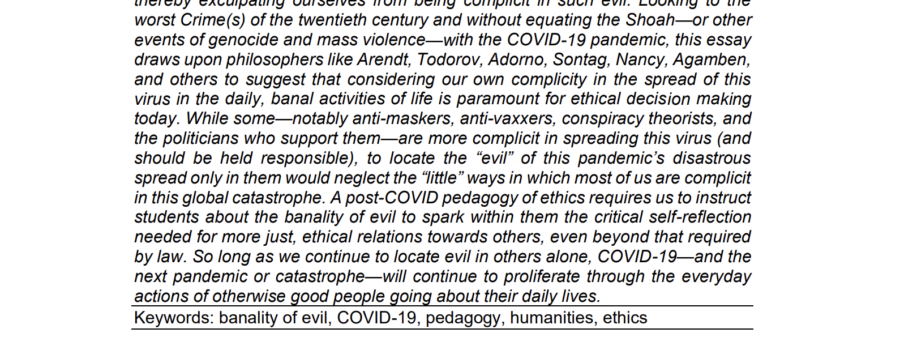Dr. Mike Piero’s essay, “Post-COVID Pedagogy and Ethics: A Call to Teach the Banality of Evil,” appeared in the peer-reviewed journal, The CEA Mid-Atlantic Review, vol. 29, 2021, pp. 39-51.
Abstract:
This essay argues that the banality of evil serves as a much-needed concept
through which to understand and respond to the COVID-19 pandemic. Toward
reducing COVID-19 spread, suffering, and death, humanities professors should
engage their students about the tendency we each have to locate evil in the other,
thereby exculpating ourselves from being complicit in such evil. Looking to the
worst Crime(s) of the twentieth century and without equating the Shoah—or other
events of genocide and mass violence—with the COVID-19 pandemic, this essay
draws upon philosophers like Arendt, Todorov, Adorno, Sontag, Nancy, Agamben,
and others to suggest that considering our own complicity in the spread of this
virus in the daily, banal activities of life is paramount for ethical decision making
today. While some—notably anti-maskers, anti-vaxxers, conspiracy theorists, and
the politicians who support them—are more complicit in spreading this virus (and
should be held responsible), to locate the “evil” of this pandemic’s disastrous
spread only in them would neglect the “little” ways in which most of us are complicit
in this global catastrophe. A post-COVID pedagogy of ethics requires us to instruct
students about the banality of evil to spark within them the critical self-reflection
needed for more just, ethical relations towards others, even beyond that required
by law. So long as we continue to locate evil in others alone, COVID-19—and the
next pandemic or catastrophe—will continue to proliferate through the everyday
actions of otherwise good people going about their daily lives.


